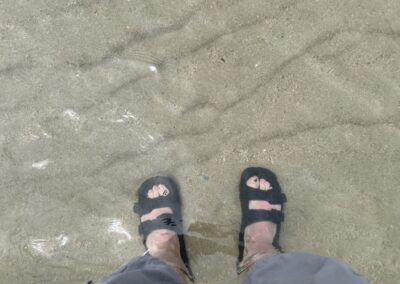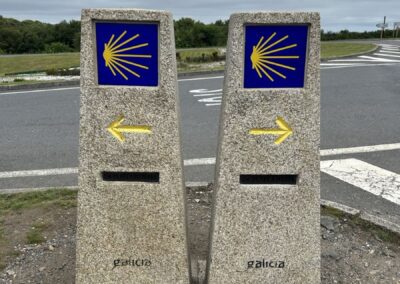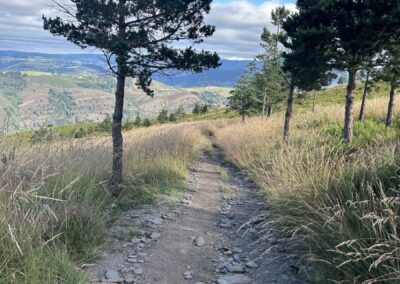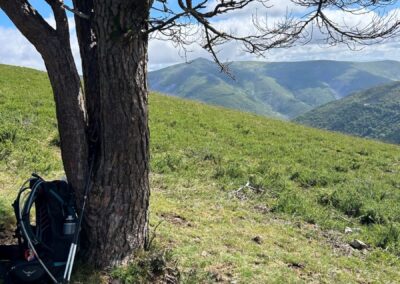What is often described as the most beautiful Camino, and also one of the most challenging, is the Camino Primitivo. It starts in Oviedo, and cuts through the mountains between the Camino del Norte and the Camino Frances. For most people it is a 13 day walk to Santiago, with an extra two days if you start from the Camino del Norte at Villaviciosa.
There are many things that make this particular path an interesting walk. It is the oldest and the one that is described as the path of the very first pilgrim in the year 814. It is far less traveled than most caminos. It contains some ancient ruins of pilgrim hospitals. It also has far less services (cafés, bars, restaurants, water fountains and accommodations) than other paths, which means that everyone walking tends to stop in the same places, usually about 25 to 30kms apart.
This fact has an odd effect on the experience. It means that you end up in a cohort of pilgrims that you largely see each day for two weeks. While many walk alone or with one other companion, we all find one another at the village where we all stop to sleep that night. The cohort finds each other at a local bar or restaurant to reconnect after the day’s walk. I began to call it my mobile village.
Like the experience of any village, you get to know the personalities of the villagers. The ones that want to see the football game, others who are looking for a tinto verano (red wine mixed with a cola), those who snore, those who are quiet readers, those who love to share stories. You keep up to date on news about one another, who has a blister, who needed to get their backpack transported, how one person’s knee was holding up or whether the vegan pilgrim was able to find something to eat.
There are some who you are excited to share a drink with, others who may be more peripheral… but we share this cohort, this mobile village, with one another. And when someone takes a day to rest, you lose them to the next day’s cohort and are unlikely to see them again unless you take a break day. These pilgrim groups become bonded in ways that are remarkable. Even today, I can picture most of 30ish people in my Primitivo mobile village and I recall many of their names.
When you share such an intimate and transformative experience with a group that gets to be tighter knit with each day, it is difficult to say goodbye to them. Even the ones that you didn’t spend much time with.
After the Primitivo, I found myself walking a few other paths and each time I started something new, I felt like I was starting from scratch with a new cohort. But none was as stable and long-standing as my Primitivo village. In the later part of my walking, I started to feel like I didn’t want to initiate conversation because the connection and disconnection began to wear me down. Investing in a relationship, even short term, was starting to feel a little difficult. It made me consider how similar this is to life itself when we get older. The burden of starting a new relationship of any kind starts to feel like a bigger hurdle as time goes by.
The mobile village also reminded me of living in a small community or experiencing life in a church community. You know the different characters, they are a part of your regular reality, and when they aren’t there, you miss them… even if you weren’t very close with them.
Increasingly, churches are less of a ‘lifetime commitment’ and more of a place where people come to meet a particular need for a period of time. In a society where mobility is common and people do not set up a home for life as frequently as we used to, we need to be prepared for the comings and goings of people who stay for a while and move on. Studies have shown that younger generations are not ‘joiners’ and the idea of membership is not in their vocabulary. Most of the people in our churches are of a generation that was institutionally focused and wanted to support the institution long-term. We need to grapple with how we need to change what we do and how we’re meeting the needs of those in the mobile village while some of us are permanent residents.
One way I’ve come to appreciate is to offer time-limited project tasks. Most people these days enjoy being part of something that has a beginning, middle and end. Another option is to consider listening to what people are passionate about and putting that passion to work rather than trying to shoehorn someone in to a role on a committee. Following peoples’ passion is partly the way that we listen for the movement of the Holy Spirit rather than trying to get other people to meet our needs. We need to adjust our expectations when it comes to those who join us for a good time, not a long time… and reserve our judgement of that behaviour. Let’s let the Spirit blow through, bringing with it new ideas and new energy rather than trying to box it up and bring it to a board meeting!
Rev. Éric Hébert-Daly spent June and July 2024 walking the Camino del Norte, the Camino Lebaniego, the Camino Primitivo, the Camino Inglés and the Camino Muxia/Finistera as part of his sabbatical. He walked 1458kms carrying his backpack across mountains, fields and coasts while holding communities of faith and ministry personnel in prayer. Éric will share some insights of his journey over the coming months.




